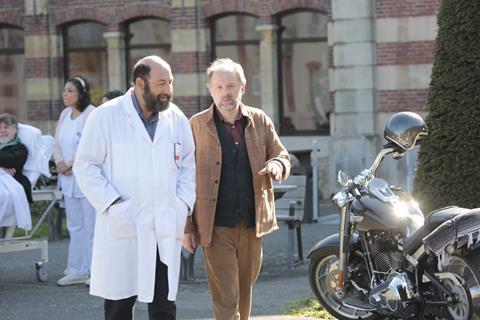The Last Breath Dir. Costa-Gavras. France. 2024. 110 mins It's hardly a surprise that a film about death might come across as somewhat lugubrious
The Last Breath
Dir. Costa-Gavras. France. 2024. 110 mins
It’s hardly a surprise that a film about death might come across as somewhat lugubrious, but The Last Breath – a meditation on healthcare and mortality from veteran director Costa-Gavras – might perhaps have breathed a little more lightly. Based on a book by philosopher Régis Debray and palliative care specialist Claude Grange, the film dramatizes a range of questions about physical vulnerability, death, and ways to confront the human condition; but from the start, it comes across more like a soberly dramatized seminar than as an emotionally evolving fiction.
Denis Podalydès and Kad Merad, essentially playing versions of Debray and Grange, offer thoughtful solidity at the head of an illustrious cast that includes Angela Molina, Charlotte Rampling, Hiam Abbass, and Karin Viard. But despite authoritative performances, the film never really comes alive. It may be thought-provoking in its content, but is more likely to find its niche as an educational tool than as a cinematic proposition.
The film’s dramatic potential is hampered by its overemphasis on theories and discussions around end-of-life care, leaving the audience with a sense of detachment and disconnection from the characters. The pace is slow, and the dialogue, while interesting, feels like a series of philosophical lectures rather than a genuine human experience.
Despite attempts at dramatization – sometimes lively, more often downright dogged – the film comes off as an earnest talkathon, its dialogue spiked with philosophical and literary references (Houellebecq, Lacan, François Mauriac et al). One scene in particular, in which Fabrice Toussaint and a circle of media types discuss a possible TV program on the theme, is especially laborious, and the overemphasis on his status as an instantly recognizable celebrity thinker is a wearing mannerism.
Costa-Gativas made his reputation as a master of the political thriller with films such as Z and State of Siege, but, while he sustains a note of thoughtful seriousness throughout, there’s little dramatic urgency here. Nevertheless, the heavyweight content in itself is likely to prompt viewers to speculate on their own preferred version of a ‘good death’ – although most of us would probably prefer not to go out accompanied by a twee children’s song about snails.
Production Details
- Production company: KG Productions
- International sales: Playtime, [email protected]
- Producers: Michèle Ray-Gravas, Alexandre Gavras
- Screenplay: Costa-Gavras, based on the book by Claude Grange and Régis Debray
- Cinematography: Nathalie Durand
- Production design: Catherine Werner Schmit
- Editing: Costa-Gavras, Loanne Trevisan
- Music: Armand Amar
- Main cast: Denis Podalydès, Kad Merad, Marilyne Canto, Angela Molina, Charlotte Rampling, Hiam Abbass, Alain Libolt, Agathe Bonitzer
Conclusion
While The Last Breath raises important questions about end-of-life care and the human condition, it ultimately falls short of being a compelling drama. The film’s slow pace, overemphasis on theories, and lack of emotional resonance make it feel more like an educational tool than a cinematic experience.
Frequently Asked Questions
Q: What is The Last Breath about?
A: The film is a meditation on healthcare and mortality, exploring the questions around physical vulnerability, death, and ways to confront the human condition.
Q: Who is the target audience for this film?
A: The film is likely to appeal to those interested in philosophical and literary discussions around end-of-life care, as well as those who enjoy thought-provoking, educational content.
Q: Will I find the film emotional?
A: Unfortunately, no. The film’s slow pace and overemphasis on theories make it hard to connect with the characters and their stories, leaving the audience feeling detached and uninspired.

COMMENTS